Training for the Everest Base Camp trek sets the tone for a smoother journey from the moment you land in Lukla. Many trekkers underestimate how much the mix of distance, altitude, and shifting terrain shapes the overall experience. Long walking days become manageable when your body already understands steady effort and controlled pacing.
Altitude adds its own layer of challenge because the air thins quickly as you move higher into the Khumbu. Trails range from gentle valley paths to steep climbs, so your legs and lungs need dependable stamina. With consistent preparation, most people reach Base Camp comfortably, and that simple truth should reassure anyone starting their training.
Think of your preparation as the first chapter of the adventure. The work you do now builds confidence and helps you enjoy those mountain views rather than push through fatigue. Train well, stay patient, and approach the trek with the mindset that progress comes one step at a time.
Understand the demands of the EBC trek
Each day on the Everest Base Camp route involves steady movement for five to seven hours, often with gradual elevation gain that accumulates over the week. Some sections feel straightforward, while others require short bursts of effort, especially on climbs toward Namche, Tengboche, or Lobuche. Preparing for this rhythm helps your body adapt long before you step onto the trail.
Terrain in the Khumbu shifts constantly, moving from forested paths to stone staircases and glacial valleys with loose rock. These changes challenge balance and footwork, which is why varied training pays off once you’re hiking above 4000 meters. The trail rarely feels flat for long, so getting used to continuous ups and downs makes a noticeable difference.
The altitude affects everyone because lower oxygen levels increase your breathing rate even at a slow pace. You might feel your heart working harder during simple climbs that wouldn’t trouble you at home. Training at a controlled intensity helps you stay calm and steady, giving your body more time to adjust during the actual ascent.
Build a strong Aerobic Foundation
A reliable aerobic base makes long trekking days feel smoother, especially when the trail rises steadily toward high altitude. Your goal is simple: teach your body to maintain comfortable effort for long periods without burning out. Activities like hiking, jogging, stair climbing, and cycling build that kind of endurance in different yet complementary ways.
Aim for three to five cardio sessions each week with varied durations to keep training sustainable. Shorter sessions of 30 to 45 minutes help your body adapt to consistent movement, while longer outings on weekends prepare you for the five to seven-hour days on the EBC trail. Gradual progression over eight to twelve weeks works best because your stamina improves steadily without overwhelming your joints.
Increase distance or intensity slowly so you stay injury-free and motivated. A sample pattern might include a fast-paced walk on Monday, a jog or cycle midweek, and a longer hike on Saturday. These sessions build the steady breathing rhythm you’ll rely on while moving through the Khumbu, especially on the long climb to Namche or the final push toward Gorak Shep.
Strength Training for Stability and Endurance
Strong, well-conditioned muscles help you handle steep trails, long descents, and full trekking days without feeling drained. Your lower body does most of the work on the EBC route, so focusing on legs, hips, and calves sets you up for smoother progress. A steady routine also protects your knees, especially on the downhill stretches toward Namche and Phakding.
Your core keeps you balanced on uneven ground and supports your posture when carrying a backpack. Simple stability exercises improve body control, which you’ll notice on rocky paths and narrow moraines. Upper-body strength matters, too, because stronger shoulders and back muscles make your pack feel lighter and more manageable.
Key Muscle Groups to Target
Strength work for the Everest Base Camp trek should target the muscles you’ll rely on most. Training these areas now helps you move confidently on steep climbs, uneven trails, and long days with a backpack.
- Legs and glutes: These muscles power you up long climbs like the ascent to Namche Bazaar and the ridge above Tengboche. Strong legs help you maintain steady pacing on the rolling trails between Dingboche and Lobuche without burning excessive energy.
- Calves: Your calves support every uphill push, especially on the stone staircases leading to Namche and the final rocky approach to Gorak Shep. Well-conditioned calves reduce fatigue when the trail gets steeper and the air thinner.
- Core: A stable core keeps you balanced on the uneven moraine trails near Lobuche and Gorak Shep. It also helps you maintain an upright posture while managing your breathing at altitude, which becomes increasingly crucial above 4000 meters.
- Upper body: Strong shoulders and back muscles make your backpack feel lighter on longer days, especially during the walk from Phakding to Namche and later from Debuche to Dingboche. Upper-body stability also helps you stay in control when using trekking poles on technical terrain.
Sample Weekly Strength Plan
This table gives you a simple structure you can follow two or three times each week.
| Exercise Group | Specific Movements | Sets and Reps | Purpose |
|---|---|---|---|
| Legs and Glutes | Squats, Lunges, Step Ups, Glute Bridges | 3 x 10–12 | Build power and endurance for climbs |
| Calves | Calf Raises (straight and bent knee) | 3 x 15 | Support stability on steep ascents |
| Core | Planks, Side Planks, Dead Bugs | 3 x 30–45 seconds | Improve balance on uneven terrain |
| Upper Body | Rows, Light Push Ups, Shoulder Press | 3 x 8–10 | Help manage backpack weight |
Tips for Progressing Safely
- Increase weight gradually to keep your joints comfortable.
- Keep movements slow and controlled to improve strength without strain.
- Rest for at least one day between strength sessions.
- Mix lower body and core work for balanced development.
- Train consistently, and you’ll feel steadier on descents, stronger during long climbing days, and more confident carrying your pack across the Khumbu.
Train with Realistic Hiking Practice
Hiking is the most valuable part of your Everest Base Camp training because it mirrors the actual demands of the trail. Shorter hikes help you build rhythm, while longer outings teach your body how to manage steady effort for several hours. This kind of practice prepares you for real trekking days between places like Phakding, Namche, Dingboche, and Lobuche.
Start with easy routes and gradually increase distance and elevation so your legs adapt without stress. Add hills or stair sections because these mimic the stone steps and rolling climbs you’ll encounter throughout the Khumbu. As you build confidence, aim for hikes that last 3 to 6 hours, since they match the typical duration of EBC trekking days.
Practice with a loaded backpack so you get used to carrying the weight you’ll bring on the trail. Keep the pack light at first, then slowly increase it so your shoulders and back develop comfort and endurance. As your departure approaches, plan one longer weekend hike each week to build stamina and pacing, which will help you stay steady on the real trail.
Flexibility and Mobility Work
Good mobility keeps your joints comfortable during long days on the Everest Base Camp trail, especially when the path shifts between steps, rocks, and gentle inclines. Flexible muscles recover faster and help you move smoothly, making each day feel lighter even as the altitude rises. A consistent routine also reduces the risk of minor strains that can slow you down on the trek.
Focus on stretches for the hips, hamstrings, calves, and lower back, as these areas work hardest on steep climbs and long descents. Simple movements like hip flexor stretches, seated hamstring holds, wall calf stretches, and gentle spinal rotations keep your body loose. Adding yoga or a short mobility flow two or three times a week builds fluidity that you’ll appreciate on the uneven sections near Tengboche and Gorak Shep.
Spend a few minutes stretching after cardio or hiking sessions since warm muscles respond better and relax more easily. You don’t need long routines, just steady practice that keeps your body feeling ready for the next session. Consistency makes the most significant difference, especially as your training volume increases in the final weeks before your trek.
Mental Preparation
A steady mindset helps you enjoy the Everest Base Camp trail even on tougher days. The altitude, long walking hours, and constant terrain changes require patience, controlled pacing, and confidence. Training your mind now makes the actual trek feel more manageable and far more rewarding.
Key Mental Skills to Build
- Pacing discipline so long climbs like Namche Hill feel smoother
- Focused breathing to stay calm when the altitude makes the effort heavier
- Motivation and consistency during training weeks with busy schedules
- Positive self-talk for long days between Dingboche, Lobuche, and Gorak Shep
- Adaptability when the weather changes or energy dips during the trek
Simple Mental Training Techniques
| Technique | How to Practice | Benefit on the EBC Trail |
|---|---|---|
| Pacing Control | Walk slower than your natural speed during training hikes | Helps manage climbs like Namche Hill without burnout |
| Breathing Rhythm | Inhale for two steps, exhale for two; practice during workouts | Keeps energy stable at higher altitudes |
| Mindful Walking | Notice foot placement, breathing, and surroundings | Improves focus on rocky trails near Lobuche and Gorak Shep |
| Goal Setting | Set weekly training goals and track progress | Strengthens motivation during long trekking days |
Altitude Awareness
You can’t fully replicate high altitude at home, but you can prepare your body and mindset for how it feels on the Everest Base Camp trail. The air thins quickly after Namche, and every step above 4000 meters requires steady breathing, patience, and controlled effort. Understanding how altitude affects you helps you move confidently and avoid unnecessary stress during the trek.
Focus on the habits that support safe acclimatisation. Stroll on ascents, drink water consistently, and listen to your body when you feel your breathing change. Recognising early signs of altitude discomfort, such as headaches, loss of appetite, or unusual fatigue, allows you to respond before symptoms worsen. These small decisions protect your energy and make the journey much more enjoyable.
Choose an itinerary with proper acclimatisation days because these breaks give your body time to adjust. Days in Namche and Dingboche are essential since they ease the jump to higher elevations like Lobuche and Gorak Shep. With these practices, you’ll give yourself the best chance to stay healthy, comfortable, and ready for the final walk to Base Camp.
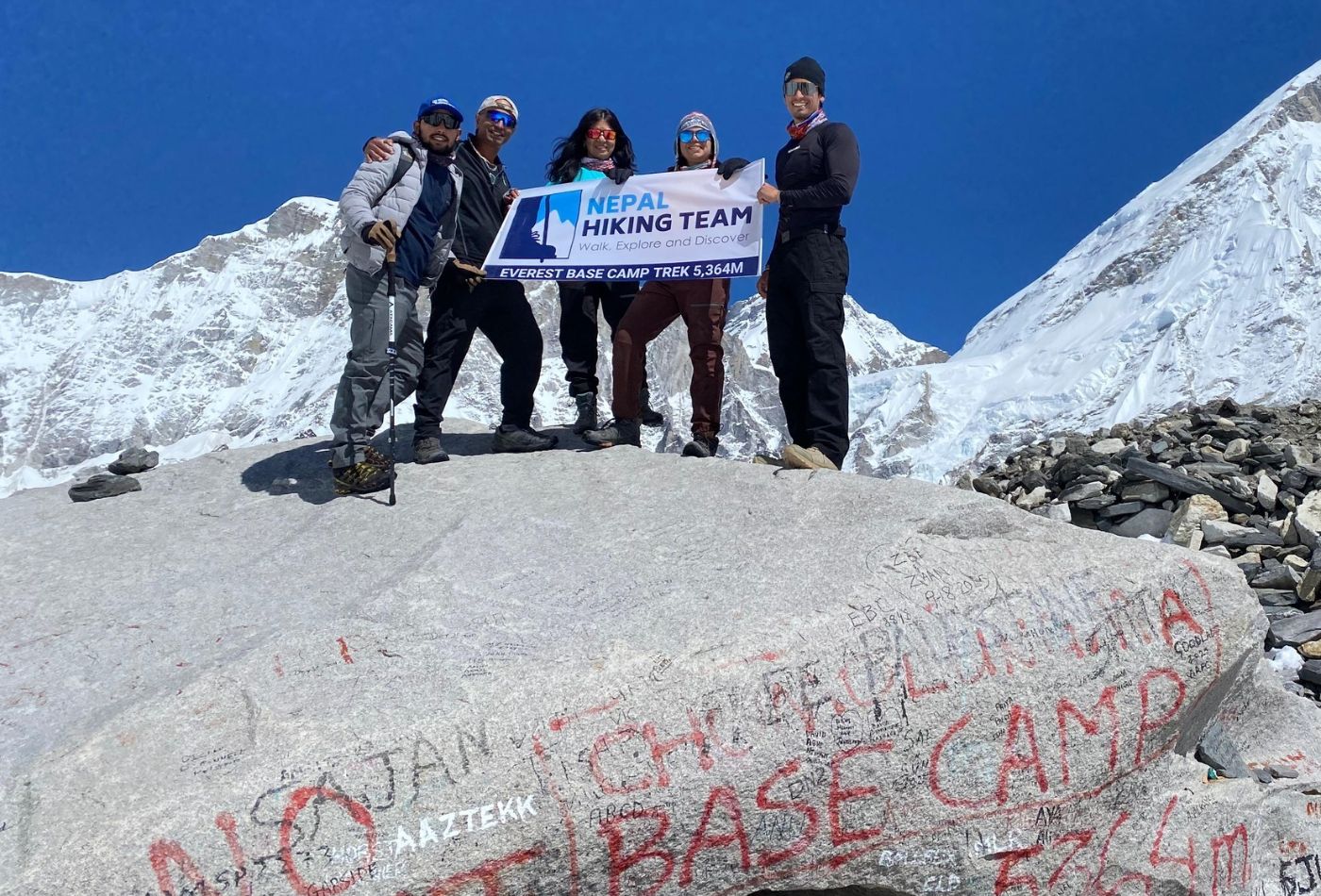
Nutrition and Hydration During Training
Foods during your training help you maintain steady energy for long workouts and weekend hikes. Focus on balanced meals that combine complex carbohydrates, lean protein, and healthy fats since these nutrients support endurance and recovery. Simple choices like whole grains, eggs, lentils, nuts, and vegetables keep your energy level stable without feeling heavy.
Hydration habits matter just as much because the EBC trek often feels drier at altitude. Drink water consistently through the day instead of waiting until you feel thirsty, and include electrolytes during longer sessions or hot weather. These habits transfer directly to the trail, where proper hydration reduces fatigue and helps your body adjust to the altitude.
Fuel your long practice hikes the same way you’ll fuel yourself in the Khumbu. Eat a light meal one or two hours before training, carry small snacks like trail mix or energy bars, and take regular sips of water. Learning what your body tolerates now helps you avoid surprises on the trek and makes your energy more predictable during long days on the trail.
Gear Familiarization
Getting comfortable with your gear early makes a noticeable difference on the Everest Base Camp trail. The more familiar your boots, backpack, and layers feel during training, the easier it becomes to move confidently through long days in the Khumbu.
Start training with the boots you plan to wear on the trek so they mould to your feet before you ever step into Lukla. This prevents blisters and hotspots on the trail, especially during longer days between Namche, Tengboche, and Dingboche. Aim to break them in on different surfaces, including dirt paths, stairs, and rocky routes.
Use your training hikes to adjust your backpack so the straps, hip belt, and weight distribution feel natural. Start light and slowly increase weight until you reach the amount you’ll carry on the trek. This helps your shoulders and back adapt, making the real trail far more comfortable.
Practice layering during cooler morning hikes to understand how your body reacts to changing temperatures. This becomes valuable at higher altitudes where the weather shifts quickly between sunny stretches and cold winds. Knowing when to add or remove a layer keeps you warm without overheating, which is essential for staying steady throughout the day.
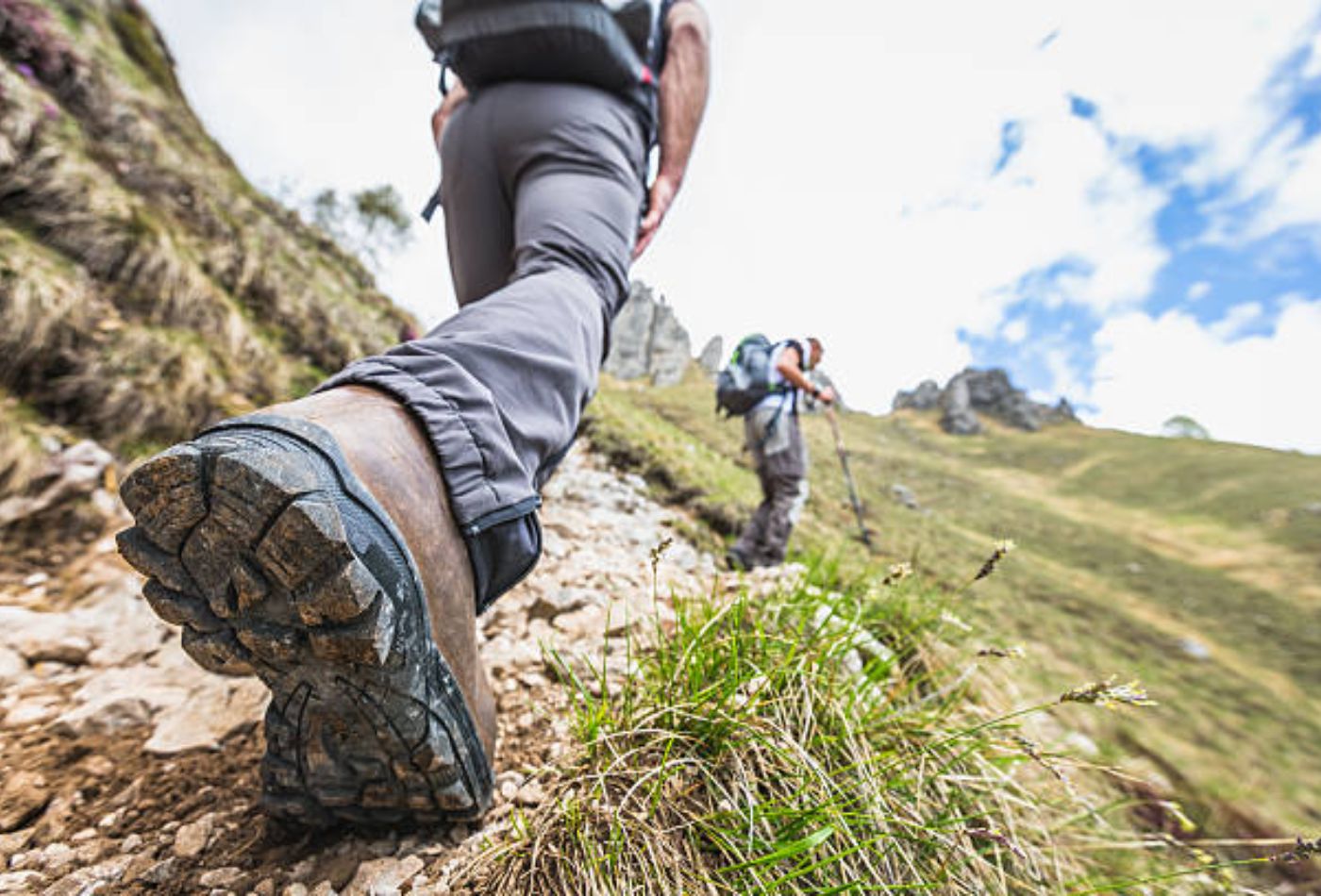
Sample 10–12 Week Training Plan
A simple structure keeps your training consistent and helps you build stamina steadily for the Everest Base Camp route. This plan blends cardio, strength training, flexibility, and hiking to help your body adapt to long days and changing terrain. The goal is to progress slowly and give yourself enough recovery to stay motivated.
Weekly Structure
- 2 to 3 cardio sessions for aerobic endurance
- 2 strength sessions for stability and climbing power
- 1 long hike or stair session to mimic trekking days
- 1 or 2 mobility sessions for flexibility and injury prevention
- 1 rest day to let your muscles recover
How to Progress Over Time
Weeks should become slightly more complicated but never overwhelming. Add distance, elevation, or time gradually so your joints stay comfortable. Longer hikes become especially valuable in the second half of the plan because they reflect the five to seven-hour trekking days from Namche to Dingboche and later to Lobuche.
Tips for Customising
- If you’re new to fitness, keep sessions shorter during the first few weeks.
- Experienced hikers can add elevation gain earlier for extra challenge.
- Keep one day flexible so you can adjust based on energy or schedule.
- Listen to your body and step back for a week if fatigue builds.
This structure prepares you for the varied demands of the EBC trail while keeping your training approachable and balanced.
When to Seek Professional Guidance
If you’re new to structured training, a professional can help you build a plan that fits your schedule, current fitness, and trekking goals. A trainer ensures your workouts stay safe and balanced, especially as you prepare for long hikes and higher training volume. Their support also helps you progress at the right pace without risking injury.
Anyone with pre-existing medical conditions should speak with a doctor before starting an EBC training program. The trek involves altitude, long hours of movement, and varying temperatures, so getting medical clearance gives you peace of mind. It also helps you understand any specific precautions you may need on the trail.
Some trekkers benefit from guided preparation programs led by fitness coaches or trekking specialists. These programs provide structure, accountability, and activity plans that match real trail demands. They’re helpful if you prefer clear guidance or simply want extra support as you get ready for the journey.
Final Motivation from Nepal Hiking Team
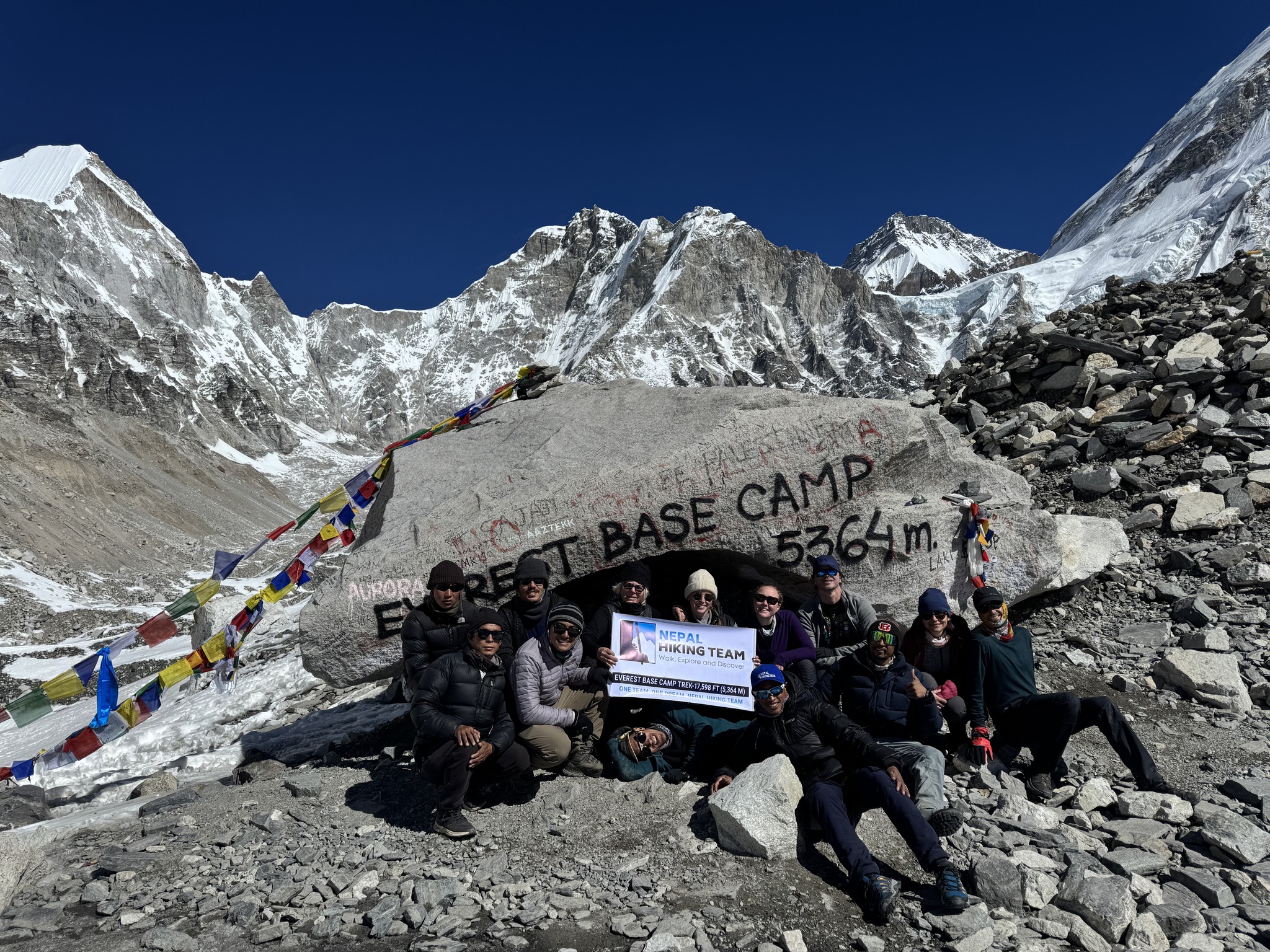
Preparing for the Everest Base Camp trek is more than a fitness routine. It’s the start of the adventure itself, and every session you complete builds confidence for the real journey ahead. The work you put in now makes the trail feel smoother, your steps more relaxed, and your experience far more enjoyable.
Enjoy the training process because it mirrors the steady rhythm of trekking in the Khumbu. Celebrate each milestone, whether it’s a longer hike, a stronger climb, or simply showing up on a busy day. These small wins add up and create the mindset that helps you stay calm and motivated at a higher altitude.
With consistent preparation, you’ll reach Base Camp with a clear head, steady legs, and a deep sense of accomplishment. Nepal Hiking Team will be with you every step of the way, ready to guide, support, and celebrate your journey. Your training builds the foundation for a safer, more rewarding, and unforgettable experience in the Himalayas.
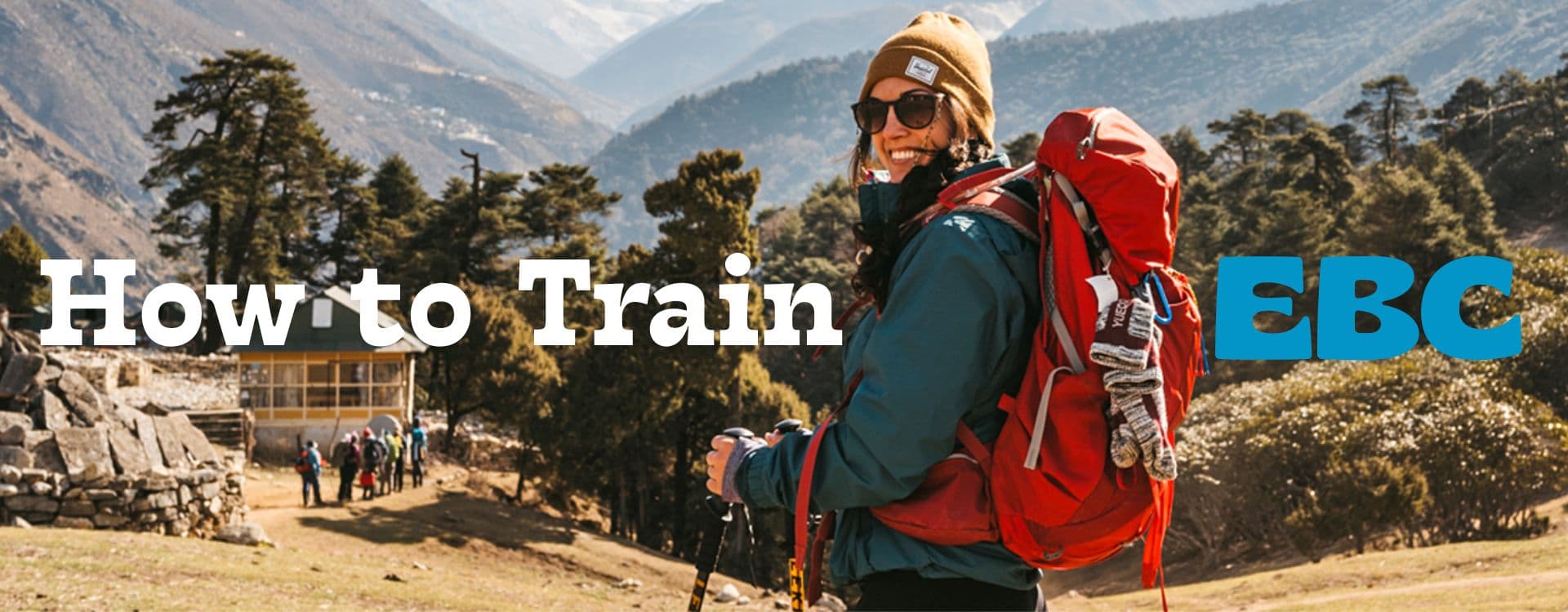

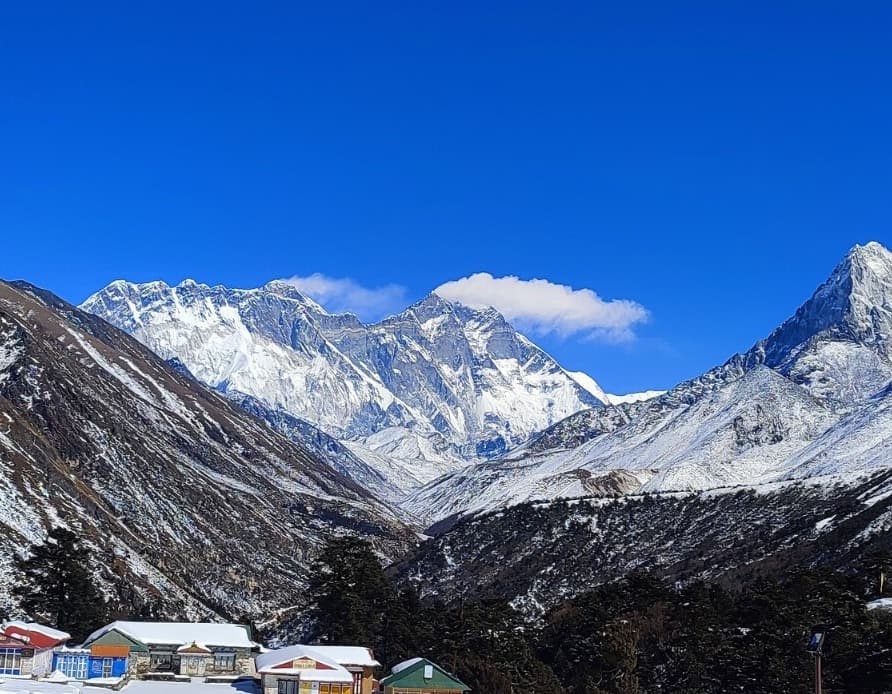
Post a Comment